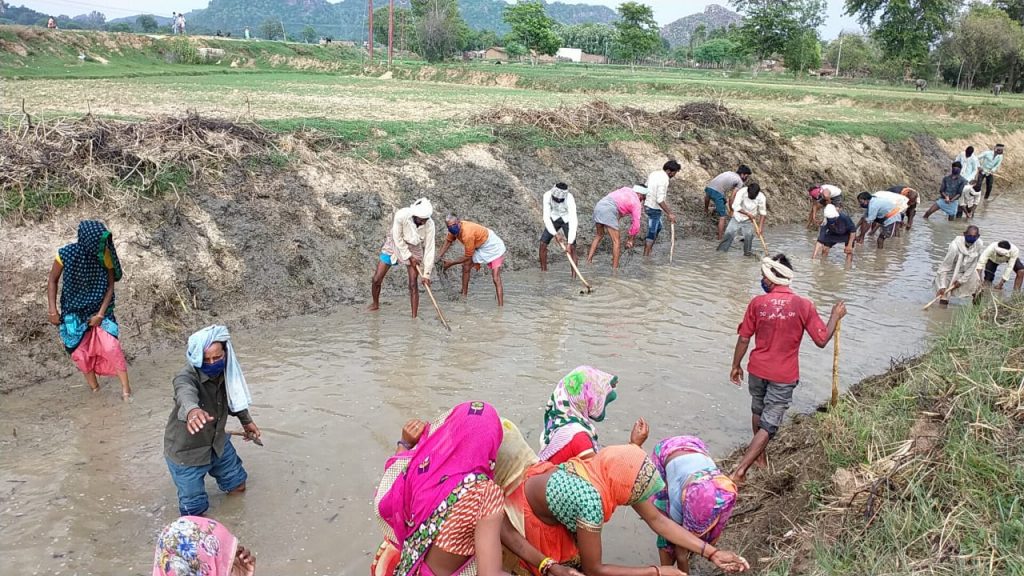COVID-19 pandemic and subsequent lockdown had a serious impact on the lives and livelihoods of thousands of migrants in India. The incoming migrants not only lost their livelihoods in the towns and cities but also had an uncertain future ahead of them. Here is an inspiring story of a group of migrants who came together to give life to a dry river so that they can stay back in their village and do farming rather than returning to the cities in search of work.
The drought prone Bundelkhand region is one of such regions which saw many migrant populations coming back to their native places. Located in this region is the Bhanwarpur village in Naraini block of Banda district, Uttar Pradesh which also witnessed many incoming migrants. Every year, almost 90 percent of Bhanwarpur’s population migrate to cities in search of employment. Those migrants who returned during the pandemic had expressed no intention of going back to the cities. They are rather determined to do farming in their village. However, being in the drought prone region, irrigating the lands became their biggest hurdle.
Dharar – the perennial river flowing through Bhanwarpur village had dried up in the recent past since it was filled with silt and watercress. Many check dams constructed on the river by the Micro irrigation department and the forest department have also affected the water flow. The migrant families decided to revive the river so that water would be available for them to start farming in the coming seasons. They were without any work or any employment and were facing food crisis.
Welthungerhilfe’s partner Parmarth Samaj Sevi Sansthan joined hands with Vidhyadham Samiti – a local CSO, to ease out the issues of these migrant families and supported them in building a secure future. On the request received from Vidhyadham Samiti, Parmarth decided to provide relief materials such as dry ration kits to the distressed families in lieu of voluntary labour contribution to revive the Dharar River.
184 individuals from Bhanwarpur village took the responsibility of this enormous task and without any government support started cleaning and clearing the river. They cleared the silt on the banks of the river till one kilometer and initiated deepening work. After working continuously for four days with support received from Parmarth and Vidhyadham Samiti, they were successful in giving the river a new lease of life. Once a dry river, Dharar River was now rejuvenated by a group of committed migrant workers to secure their future. Both men and women participated actively in this activity. Some of the labourers who contributed are Nathu, Sajivan, Mahesh, Ramdev, Jaikaran, Chandrapal, Shobhalal, Pahardin, Rani, Rambai, Asha, Pyari and Sunita.

Soon the news reached the government officials, and the Block Development Officer along with other officials visited the site and was highly appreciative about the work. The individuals of Bhanwarpur village is now committed to work on river rejuvenation work to resolve water issues and ensure enough water for irrigating their lands.
“This river had dried up due to the neglect of officials. With the exemplary support shown by Parmarth, the migrant workers were able to come forward and rejuvenate the river,” shares Raja Bhaiya from Vidyadham Samiti.
Parmarth actively works on water conservation and management in the drought prone region of Bundelkhand. They have also promoted the Bundelkhand Water Forum, a network of civil societies inclusive of representatives of CSOs, academicians and media persons under the Jal Jan Jodo Abhiyan – a national level campaign. The forum is committed to raise voices for ending water crisis in Bundelkhand region. During the coronavirus pandemic, Parmarth supported by Welthungerhilfe and the The Federal Ministry of Economic Cooperation and Development (BMZ) will work with six civil society organisations to initiate Shramdaan (voluntary) camps for migrant workers and provide ration kits in lieu of labour work.





